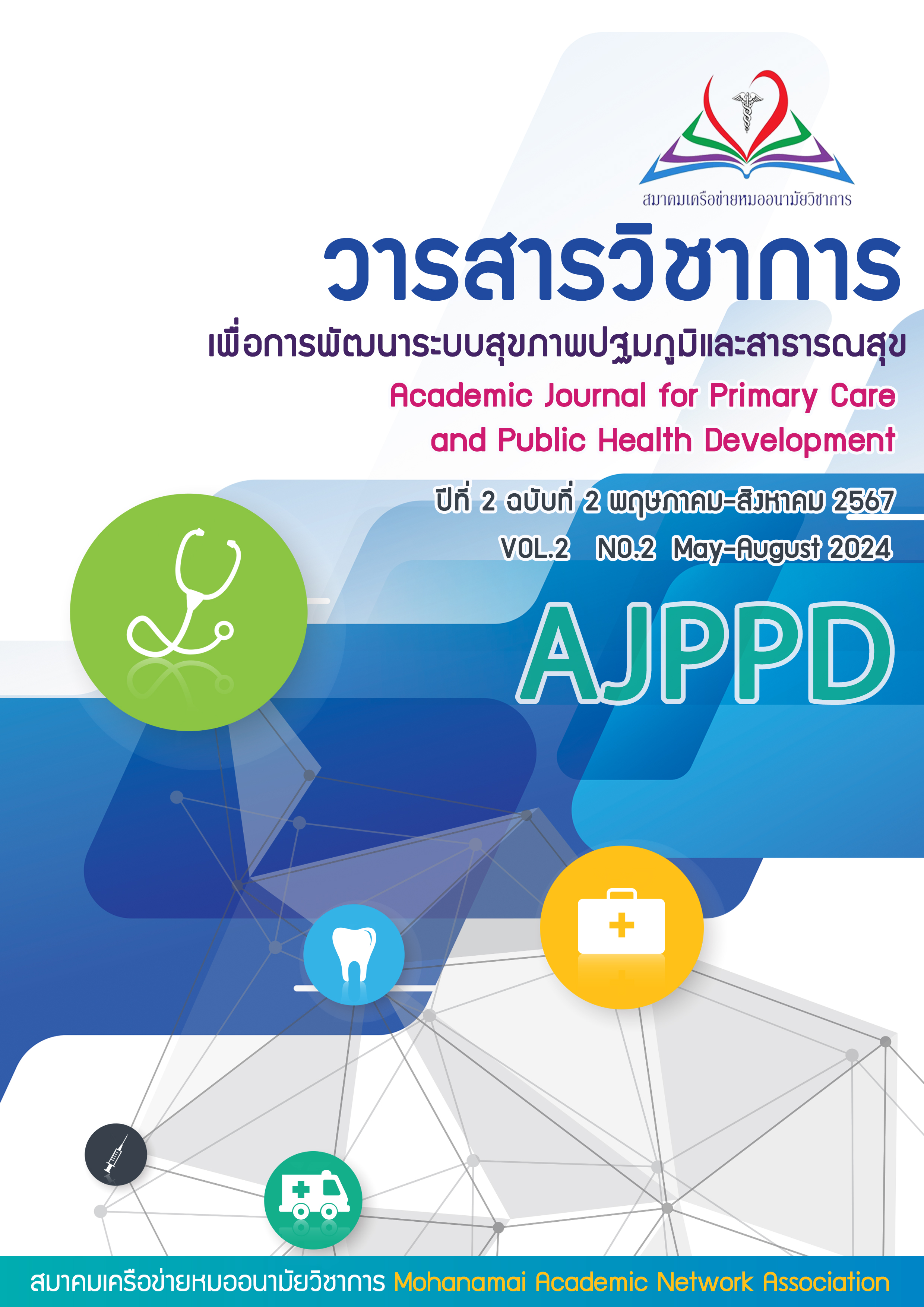Effects of Self–Regulation Program on Diet Control for Patients with Type 2 Diabetes of Non-Communicable Disease Clinic, BanKhok Hospital
Keywords:
Self-regulation program, Dietary control behavior, Type 2 diabetesAbstract
This study aimed to investigate the effects of a self-regulation program on dietary control behaviors among patients with type 2 diabetes at the Non-Communicable Disease Clinic, Ban Khok Hospital. The research employed a quasi-experimental design with a one-group pretest-posttest approach. The sample consisted of 22 patients with type 2 diabetes. The instruments used included a self-regulation program and questionnaires. Data were analyzed using descriptive statistics and paired t-tests.
The results showed that after the experiment, the sample group had significantly higher mean scores in self-efficacy perception, outcome expectations of self-care practices, and dietary control behaviors compared to pre-experiment scores (p < .001). Additionally, the fasting blood sugar levels after 8 hours decreased significantly (p < .001) from 131.24 mg/dL to 125.64 mg/dL. It can be concluded that the self-regulation program was effective in improving dietary control behaviors and reducing blood sugar levels in patients with type 2 diabetes. Involving patients in goal-setting, self-care planning, and continuous follow-up were key factors that helped patients improve their behavior and better control their disease. The findings of this research can be applied to develop care guidelines for diabetes patients in Non-communicable disease clinics of community hospitals.
References
กองโรคไม่ติดต่อ กระทรวงสาธารณสุข. (2563). จำนวนอัตราป่วย ตาย ปี 2559-2562. http://thaincd.com/2016/mission/documents-detail
ยุพิน เมืองศิริ. (2556). ผลของโปรแกรมส่งเสริมความสามารถการจัดการตนเองของผู้ป่วยโรคเบาหวานต่อค่าระดับน้ำตาลสะสม. วารสารพยาบาลศาสตร์ มหาวิทยาลัยบูรพา, 21(1), 37-51.
ศุภรัฐ พูนกล้า และ สุขสิน เอกา. (2562). ปัจจัยที่มีความสัมพันธ์กับพฤติกรรมการดูแลสุขภาพของผู้ป่วยโรคเบาหวานชนิดที่ 2 ในชุมชน. ราชาวดีสาร วิทยาลัยพยาบาลบรมราชชนนี สุรินทร์, 9(1), 30-45.
อรพินท์ สีขาว. (2559). การจัดการโรคเบาหวาน (พิมพ์ครั้งที่ 3). เอ็ม แอนด์ เอ็ม เลเซอร์พริ้นต์.
อุมาลี ธรศรี, พัชราณี ภวัตกุล, มณีรัตน์ ธีระวิวัฒน์ และ กานดาวสี มาลีวงษ์. (2561). โปรแกรมการส่งเสริมโภชนาการ: ลดหวาน มัน เค็ม ประยุกต์การกำกับตนเองและแรงสนับสนุนจากครอบครัวในผู้ป่วยโรคเบาหวานชนิดที่ 2. วารสารสาธารณสุขศาสตร์, 48(3), 284-295.
Bandura, A. (1978). The self-system in reciprocal determinism. Journal of Personality and Social Psychology, 33(3), 344–358. https://doi.org/10.1037/0022-3514.33.3.344
Bloom, B. S. (1971). Handbook on formative and summative evaluation of student learning. McGraw-Hill.
Clark, N. M., Becker, M. H., Janz, N. K., Rakowski, W., & Anderson, L. (1991). Self-management of chronic disease by older adults: A review and questions for research. Journal of Aging and Health, 3(1), 3-27. https://doi.org/10.1177/089826439100300101
Cohen, J. (1988). Statistical power analysis for the behavioral sciences (2nd ed.). Lawrence Erlbaum Associates.
Polit, D. F., & Beck, C. T. (2010). Essentials of nursing research: Appraising evidence for nursing practice (7th ed.). Lippincott Williams & Wilkins.
Saengsuwan, S., Asawachaisuwikrom, W., & Homsin, P. (2011). ผลของโปรแกรมการกำกับตนเองร่วมกับการให้ข้อมูลทางคลินิกต่อพฤติกรรมการรับประทานอาหารและระดับน้ำตาลในเลือดในผู้ป่วยเบาหวานที่ควบคุมไม่ได้ [Effect of self-regulation with clinical information program on eating behavior and blood sugar level among uncontrolled diabetic patients]. วารสารคณะพยาบาลศาสตร์ มหาวิทยาลัยบูรพา [Journal of Faculty of Nursing Burapha University], 19(3), 54-64.
Shen, H., Edwards, H., Courtney, M., McDowell, J., & Wu, M. (2012). Peer-led diabetes self-management programme for community-dwelling older people in China: Study protocol for a quasi-experimental design. Journal of Advanced Nursing, 68(12), 2766-2777. https://doi.org/10.1111/j.1365-2648.2012.06059.x
Walker, E. A., Shmukler, C., Ullman, R., Blanco, E., Scollan-Koliopoulus, M., & Cohen, H. W. (2011). Results of a successful telephonic intervention to improve diabetes control in urban adults: A randomized trial. Diabetes Care, 34(1), 2-7. https://doi.org/10.2337/dc10-1005
Youkong, S., Sompopcharoen, M., Kengganpanich, T., & Rawiworrakul, T. (Eds.). (2015). Effects of self-regulation program on diet control for patients with type 2 diabetes. In The 17th national health education conference on "the role of people and the change in health behavior". Jomtien Palm Beach Hotel and Resort.

Downloads
Published
How to Cite
Issue
Section
License

This work is licensed under a Creative Commons Attribution-NonCommercial-NoDerivatives 4.0 International License.





